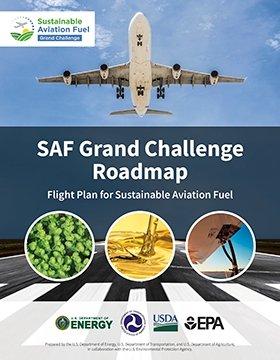
Sustainable aviation fuel (SAF) supply chains encompass feedstock production, collection, and distribution to SAF production facilities; conversion of feedstock to fuel; and transport of finished fuel to the infrastructure required to fuel aircraft. Because current fuel certifications currently require SAF to be blended with conventional fuels, the SAF supply chain also requires coordination with conventional jet fuel industries. As SAF production is a nascent industry, SAF supply chains are immature, may be regionally unique, and will likely require significant resources and investment to establish. This action area will support SAF production expansion through R&D transitions from pilot to large scale, demonstration projects to validate supply chain logistics and business models, and public–private partnerships and collaboration with regional, state, and local stakeholders.
Key Actions and Workstreams Supporting SAF Building Supply Chains
Download the full version of the SAF Grand Challenge Roadmap: Flight Plan for Sustainable Aviation Fuel. |
- Convene regional stakeholder coalitions to lead the exploration and development of SAF supply chains and provide outreach, extension, and education supporting SAF supply chain growth.
- Develop and disseminate comprehensive data, analysis, and modeling tools as a foundation for the development of low-greenhouse gas, cost-effective deployment of feedstock to fueling supply chains, SAF manufacturing, and logistics solutions.
- Support feedstock-to-fueling demonstration projects to de-risk and mature key elements in the supply chain from feedstock through airport distribution.
- Invest in commercial-scale SAF production infrastructure and facility development with existing and new public–private partnerships to expand domestic SAF supply.
2030 Building Supply Chains Impact Highlights
Convene and Support Stakeholder Coalitions
Standing up complex SAF supply chains will involve engagement with and contributions from a diverse group of stakeholders. Convening and incentivizing stakeholder coalitions will be vital to developing regional solutions to build a renewable fuels industry that improves environmental and economic performance while supporting job creation. These coalitions will need to evaluate all elements of the supply chain and provide recommendations to advance deployment, attract investment, advocate for policy change, support workforce development, and identify solutions to deployment barriers and risks.
Invest in SAF Infrastructure
Utilize loans and loan guarantees, assistance grants, and other government funding mechanisms and opportunities to enable rapid scaling of commercial technologies. For 2030, these investments will leverage existing corn ethanol and agricultural industry and infrastructure to accelerate production, as well as existing rail/heavy-duty/long-haul transport for airport SAF supply. Near-term investments are expected to build on existing oil and gas refinery and other industrial brownfield industry and infrastructure to accelerate and ramp up to required volumes of production.

